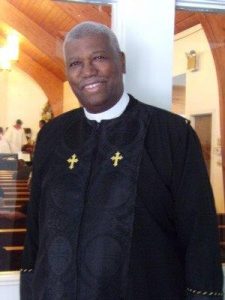

Our History
 Reverend Leroy Attles can still recall the day he encountered a homeless mother and her children on the steps of St. Paul African Methodist Episcopal (AME) Church one day back in 1984. He remembers being troubled by knowing they had no place to stay. “They were in the street. That hit my heart,” Rev. Attles said in an interview. “I was inspired to do something.”
Reverend Leroy Attles can still recall the day he encountered a homeless mother and her children on the steps of St. Paul African Methodist Episcopal (AME) Church one day back in 1984. He remembers being troubled by knowing they had no place to stay. “They were in the street. That hit my heart,” Rev. Attles said in an interview. “I was inspired to do something.”
Attles was the pastor of St. Paul AME Church in Central Square, Cambridge. At the time, St. Paul had recently established a social action ministry that provided food, clothing and other services for people in need. That ministry was first called the Hildebrand Outreach Center. During that same period, in 1986, Philip Mangano became the director of Homeless Services for Cambridge. Mangano was trying to find potential new sites to shelter people, because, at that time, many of Cambridge’s unhoused community were forced to stay at out-of-town shelters or motels far from Cambridge. Mangano learned that St. Paul AME Church owned two buildings near the church and met with Rev. Attles to discuss the possibility of converting the old building that housed the church rectory and one other church-owned building into shelters. Rev. Attles agreed, and the city worked with the church to renovate the two buildings.
In 1988, Hildebrand became an independent 501(c)(3) nonprofit organization. The organization is named after the regional bishop, Rev. Richard Allen Hildebrand, who authorized the rehabilitation of St. Paul’s former parsonage for use as a shelter for families. Together, the two original buildings provided temporary housing for up to 14 families. Hildebrand also provided supportive services to help families develop the educational, vocational, and life skills necessary to stabilize their lives while seeking permanent homes.
At the time of its founding, Hildebrand also stood out because of its culturally responsive services. Because of Hildebrand’s roots in the St. Paul AME Church, a historically and predominantly African-American church, Hildebrand was able to offer culturally appropriate programs and services for families experiencing homelessness. In the mid-1980s, almost all shelters were led by white people, even though there were Black residents among those experiencing homelessness in Cambridge, so Hildebrand bridged an urgent gap.
Since its founding, Hildebrand has grown significantly. Now, Hildebrand operates 157 emergency shelter units and 22 units of permanent housing across Boston and Cambridge, reaching over 380 families—1,100 individuals—each year.
Do you want to help support Hildebrand?
Contact
614 Massachusetts Avenue
Third Floor
Cambridge, MA 02139
Ph: 617-491-5752
F: 617-491-2385
